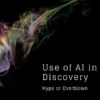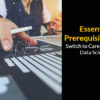Are Mathematics & Statistics mandatory for entering the Data Science Field?
Everyone today is talking about Big Data. Although the term itself has been attributed to a number of people, case studies, papers and even works of fiction, the most recurrent — and likely — belief is that the origin of ‘Big Data’ as a buzzword, a catchphrase — and a term we all know and use today, is with American computer scientist John Mashey in the early 1990s.
Yes, it’s that recent!
Full disclosure – big data is not completely absent of maths and statistics. However, you don’t need to have done a course in it or be well-versed in it to be able to start your career in the field! You can start from scratch to build that dream.
The writer of this post herself used to be a student of literature, languages and psychology, and studied data as a side course at university – but she has since then gone on to read more and more – and this is after a degree in communication! Your qualification does not need to dictate what you can and can’t do. Sky’s the limit!
The Maths: If I’m bad at numbers or not so comfortable with them, will it be a problem?
And you will be happy to know that not everybody who was eventually involved with the concept, or even the field, is a professional mathematician, or a statistician or a stats genius. While we may instantly imagine scores and scores of numbers and figures being involved in big data (and they are – but for the machines!), you need not necessarily have a strict mathematical background to understand the concept.
We have all studied our basic level of maths and statistics in school, and many of us even in our early years of college; it is not so much a thorough knowledge or expertise of stats per se, than it is an understanding of basic Mathematical and statistical concepts which we have all studied in our school and some early college days.
In big data and data science, it is the practical applications of things that are more important in understanding, or dipping your toe into the field before you take the proverbial ‘leap’ into it. If you have a critical, open mind and like to deconstruct problems to figure out practical solutions, you will certainly enjoy data science. As long as you still remember your basics, there is not really a necessary need for a degree in just one specific field for a career in data science.
Knowing and revising your basic concepts is more important
Even if the thought of basic stats issues being needed worries you, don’t. Those basic concepts can be learned and relearned. It is critical thinking that is truly, critical, as they say, to understanding the basic building blocks of ‘Big Data’ and consequently, the larger parts of data science as a whole.
You do not necessarily have to be properly conversant with the advanced statistics that so many students of mathematics and the sciences have needed in the past and present for their respective academic courses.
Also, keep in mind that the sheer size of the internet means both it – and its related concepts are ever-changing, so no fixed course like maths or stats can necessarily give you all the tools you need.
How GradValley can help you achieve those dreams
GradValley offers programs that are tailored to avail different Big Data and Data Science streams right from Big Data Engineering, Big Data Analytics and Data Science with AI/ML.
Also these programs are geared towards the practical needs of someone pursuing data science and its related field, and taking these programs will help you get into the field – even if you feel you are lacking the degree specification or expertise to do so.
If you need more information, either visit our website www.gradvalley.in /programs and / or call our GradValley Admission counsellors now @+91 98406 68844
So just remember, not having a background in a specific science or a specific stream does not spell the end for your understanding or introduction of Data Science, and even if you lack what you feel is the ‘official’ background for it – don’t worry!
The tools you need most are critical thinking and newer, adapted courses that can help you unpack and critically analyse Data Science in its most raw, dynamic form.






Hi
It was nice to read this post.
I want to ask as I am from a research field in nanoscience, did the big data have any application or helpful in my field of study as I am very much interested for this.